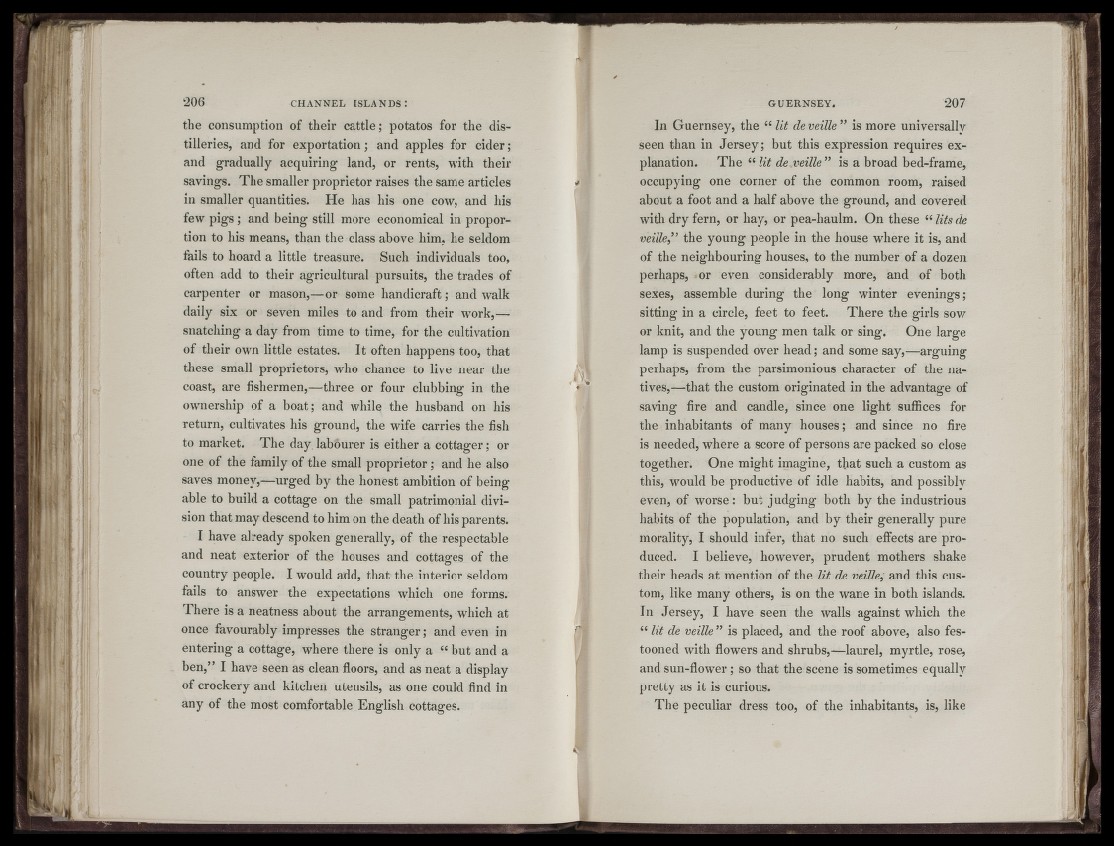
I »
If
lv
the consumption of their cattle; potatos for the distilleries,
and for exportation ; and apples for cider ;
and gradually acquiring land, or rents, with their
savings. The smaller proprietor raises the same articles
in smaller quantities. He has his one cow, and his
few pigs ; and being still more economical in proportion
to his means, than the class above him, he seldom
tails to hoard a little treasure. Such individuals too,
often add to their agricultural pursuits, the trades of
carpenter or mason,—or some handicraft ; and walk
daily six or seven miles to and from their work,—
snatching a day from time to time, for the cultivation
of their own little estates. It often happens too, that
these small proprietors, who chance to live near the
coast, are fishermen,—three or four clubbing in the
ownership of a boat; and while the husband on his
return, cultivates his ground, the wife carries the fish
to market. The day labourer is either a cottager ; or
one of the family of the small proprietor ; and he also
saves money,—urged by the honest ambition of being
able to build a cottage on the small patrimonial division
that may descend to him on the death of his parents.
I have already spoken generally, of the respectable
and neat exterior of the houses and cottaoges of the
country people. I would add, that the interior seldom
fails to answer the expectations which one forms.
There is a neatness about the arrangements, which at
once favourably impresses the stranger ; and even in
entering a cottage, where there is only a “ but and a
ben,” I have seen as clean floors, and as neat a display
of crockery and kitchen utensils, as one could find in
any of the most comfortable English cottages.
In Guernsey, the “ Ut de veille ” is more universally
seen than in Jersey; but this expression requires explanation.
The “ lit de veille” is a broad bed-frame,
occupying one corner of the common room, raised
about a foot and a half above the ground, and covered
with dry fern, or hay, or pea-haulm. On these “ lits de
veille," the young people in the house where it is, and
of the neighbouring houses, to the number of a dozen
perhaps, or even considerably more, and of both
sexes, assemble during the long winter evenings;
sitting in a circle, feet to feet. There the girls sow
or knit, and the young men talk or sing. One large
lamp is suspended over head; and some say,—arguing
perhaps, from the parsimonious character of the natives,—
that the custom originated in the advantage of
saving fire and candle, since one light suffices for
the inhabitants of many houses; and since no fire
is needed, where a score of persons are packed so close
together. One might imagine, that such a custom as
this, would be productive of idle habits, and possibly
even, of worse: but judging both by the industrious
habits of the population, and by their generally pure
morality, I should infer, that no such effects are produced.
I believe, however, prudent mothers shake
their heads at mention of the lit de veille, and this custom,
like many others, is on the wane in both islands.
In Jersey, I have seen the Avails against which the
“ lit de veille ” is placed, and the roof above, also festooned
with fiowers and shrubs,—laurel, myrtle, rose,
and sun-fiower ; so that the scene is sometimes equally
pretty as it is curious.
The peculiar dress too, of the inhabitants, is, like
ul
il
!T
:ti
hi
1 !
HU
* i
..ti
".J
ir
f i